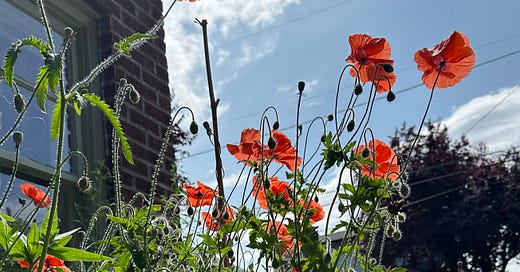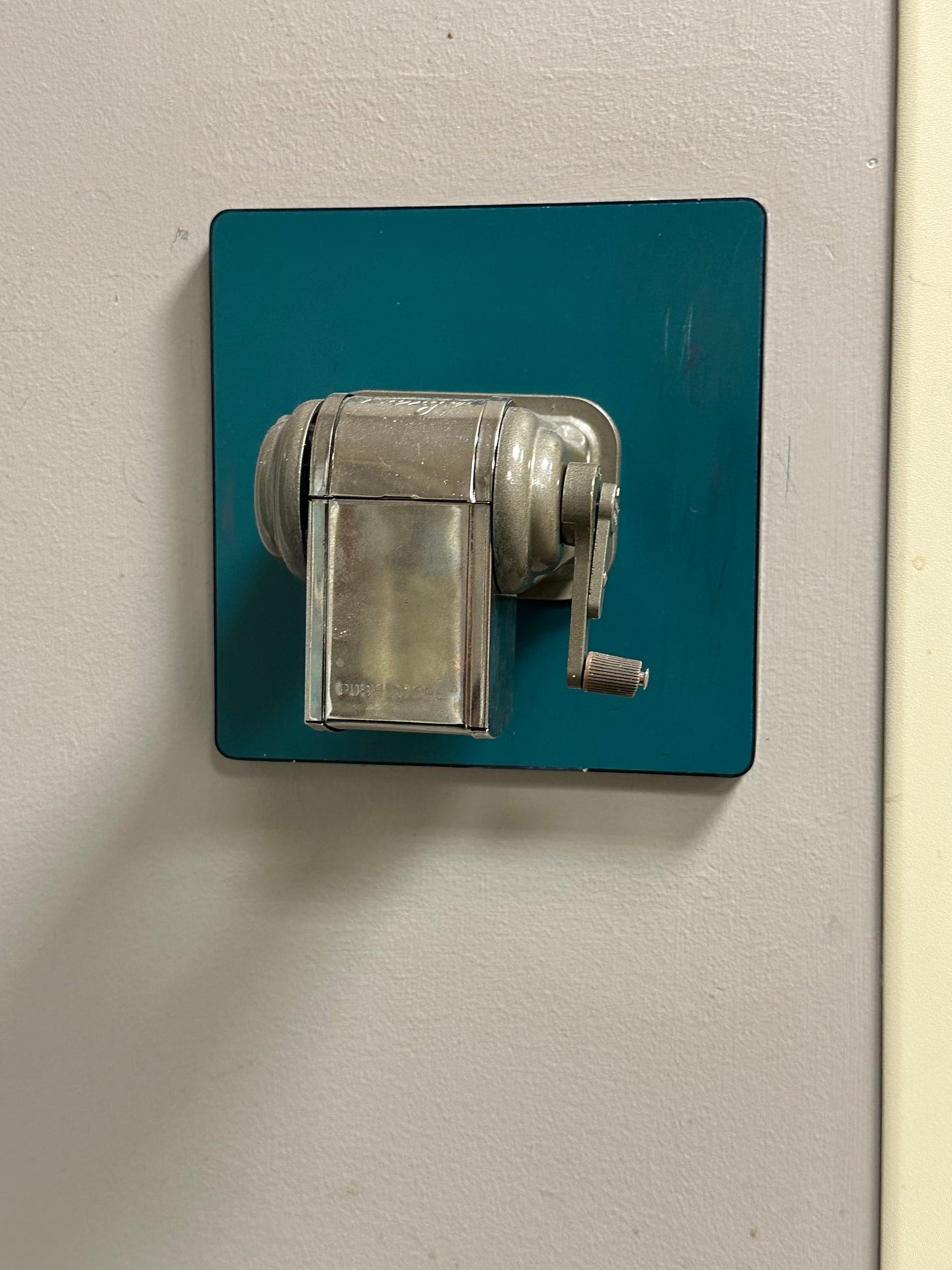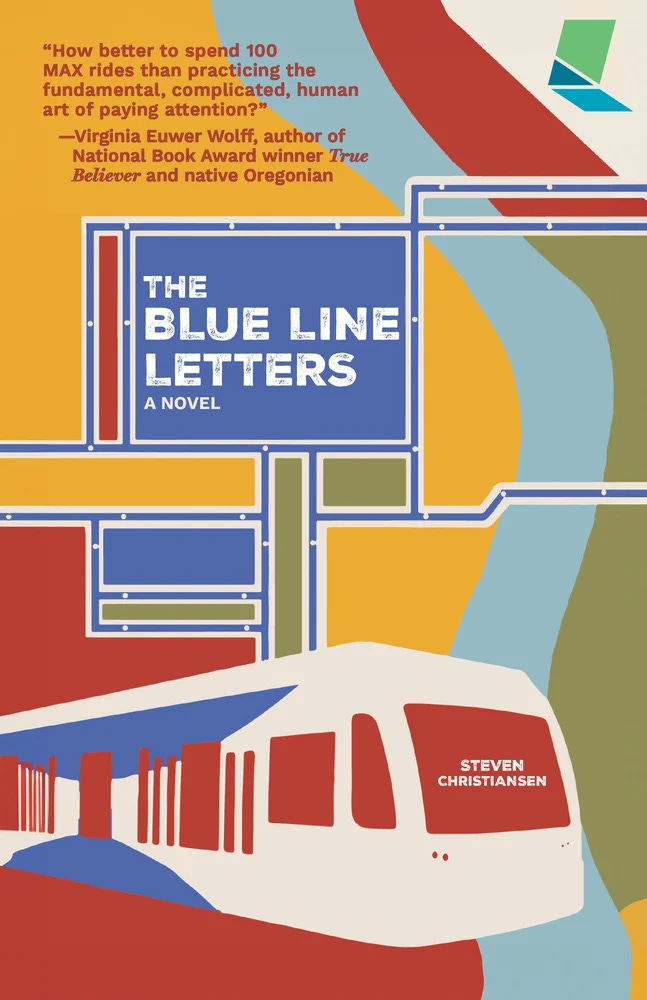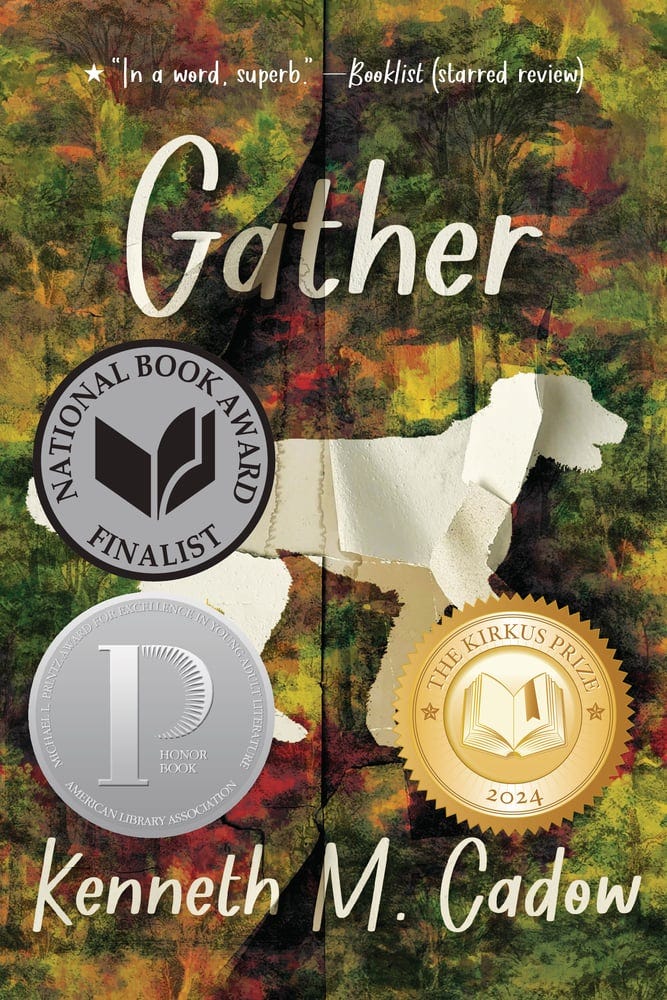Check in
Hello, summer
June 14 is the last day for Portland public schools. Wheeling past Richmond Elementary in Southeast Portland, I encounter beaming children and parents toting art projects and backpacks. One little girl wears a kimono, appropriate to Richmond, home of a Japanese immersion program.
The atmosphere is buoyant and pleasant, a whole summer of opportunity opening up. Far away are the boredom and heat of August, when some kids start wishing, as I used to, that school would start sooner.
Head’s up, the solstice is past us already. It was yesterday, June 20. Shorter days are coming. Meanwhile, these poppies are living in the moment.
Clock-less
Time is too much with us. What if I were to put away clocks? Turn off the alarms and put a cover over the glowing digital readouts.
But doing that would make me anxious. When I get up in the middle of night I want to know what time it is.
Besides, I don’t need another routine.
Time like a freeway
Oliver Burkeman, who writes about time and how we use it, notes that the more we do, the more lists we check off, the more work piles on. My analogy is that it’s like building freeways. Adding more lanes never eases congestion. They just fill up with more cars.
If we have just the smallest slice of empty time, something will come along to fill it. Even if we’re bored, there’s another video game. And email is always with us.
Let them go
The way to make work go away is to not do it. You can’t do everything, so do what matters most and let the rest go. Applying this to my life, I see I don’t need to inventory the contents of all my sewing boxes—although it would be useful when I’m looking for a particular item, say, a bodkin, and I could look up where I put it.
Reading Burkeman’s book, Four Thousand Weeks: Time Management for Mortals has helped me to iron out some wrinkles in thinking about routine. Time, Burkeman writes, is not a constraint. It is a gift. Maybe we shouldn’t be in such a rush to fill every second.
There is only today, this hour, this instant. Burkeman’s breakthrough is understanding that it isn’t that we don’t have enough time, it’s that we have any time at all. This understanding frees us to look at time as a gift, not as an enemy, or a merciless taskmaster. Instead of fearing how time strangles us, let it free us.
Dare to be bored
I committed to not trying to fill every crevice of time with something purposeful, even before I read Burkeman’s book. Thanks to living for several years in an assisted living facility that was run by a Jewish organization, I’m used to having two Sabbaths, Saturday in the Hebrew tradition, Saturday with the Christians.
Those are days when I don’t look at clocks much. I sit in my recliner and read and dream and write poetry. I take the bus to wherever—what I call “bus therapy.” Trimet obliges by running many lines on frequent schedules even on Sunday.
I just take it easy on those days, don’t schedule much beyond church. I might go to a farmers market and write poems for strangers.
Tool out of time
Make a quiet moment to contemplate a simple object. It will do your heart good.
I found this pencil sharpener in the Millar Library at Portland State University. In an age of gel pens and mechanical pencils, who still uses wood-and-graphite pencils? Plenty of people. Blackwing pencils are fun to write with. They write crisp and clear and the lines don’t smudge.
Singing in parts
I have started singing tenor in the church choir. Like many church choirs, mine has more women than men, so the fact that two of us women have lower voices is a plus. My voice is pitched low enough that it’s hard for me to reach high D when the melody goes that high. This is not unusual for tall people with long vocal cords.
I’ve always liked the challenge of singing something other than the melody. For many years I was an alto. I consider myself musical, but it still took a long time for me to able to hear that lower part and sing it well. I remember sitting in the congregation with one of my daughters when she was still was a teen, struggling with the alto line. She whispered to me that I sounded like a frog. I don’t know why it took so long, but suddenly, maybe 10 or 20 years ago—it’s so hard to remember when you’re old—I was able to hear the alto line, singing it easily and accurately.
I like picking out the tenor part from the tangle of notes and harmonies, too.
I’ve tried singing bass, and I have the range to do it, but a woman’s voice doesn’t have the resonance of a man’s. It’s just biology.
Poetry break
Nearby trees
A redbud, a maple, a catalpa in gentle embrace. A dance of trees, branches that yearn for others. Do they know one another? Their roots mingle in the earth, Squirrels leap from one to the next. Crows’ mighty knowing Blesses their branches, like the house wrens’ throaty twitter. Their trunks stand, mighty and slender (the redbud is young). Solid, serene, my street trees, My bastions forever.
About dogs
I’m trying to feel good about dogs. But I’m encountering them in all sorts of inappropriate places. People bring their humongous pets into coffee shops and the greengrocer’s. I encounter them on the bus, where small dogs are usually not on a leash, being held in a passenger’s arms or tucked into a purse or riding in a baby carriage. Trimet rules are service pets only, but the drivers aren’t the police. Some of the big dogs have vests that ID them as service animals; most don’t.
I’m not the police, either. So I’m trying to just cool it. In the immortal words of my self-help guru, Mel Robbins, just “let them” have their dogs.
To make myself feel better about dogs, I wrote a poem about German shepherd poop. And when I saw the van for a mobile pet grooming operation, I decided to contact the owner, Sally Winslow.
She started Sweetpea Mobil Pet Spa after COVID shut down the shop where she had been working. She chose the name Sweetpea because it’s short, sweet and memorable—and Cut a Bitch Mobile Grooming had already been taken.
Working the dog
Mobile grooming is a good option for dogs that don’t do well visiting a canine styling salon. And it’s convenient for the pet’s human, too. It costs $135 to have your pooch groomed, but that buys a lot of things I would never consider if I was just washing a dog in the bathtub. As Sally notes,
All of our grooms come with gland expression, ear cleaning and plucking (if requested), nail clipping and dremelling, teeth brushing and fresh breath spray, hydromassage, blueberry facial, a bath using environmentally-friendly shampoo and conditioner chosen for your dog’s specific skin and coat needs, and a brush out.
Dremelling uses an electric gizmo to buff the dog’s toenails.
A benefit of having the dog groomed in the van is that the process is distraction-free. Owners aren’t allowed, for insurance and practical reasons; it’s just Sally and the pooch.
Sally appreciates the flexibility of being the solo owner of a mobile operation. If there’s a daycare glitch with her small son or she needs time for some other pursuit, it’s easy to arrange her schedule.
Mostly, thought, she gets to work with dogs all day. And that brings its own rewards.
“I believe,” she wrote me, “that the human-animal bond is essential to teaching us compassion, respect, empathy, and everlasting love, in a way that can’t be gleaned from interpersonal relationships. I feel so privileged to play a teeny tiny part in strengthening that bond!”
The library tosses books at me
I meet a friend in Sellwood for coffee at the Blue Kangaroo. Then I move on to the nearby Sellwood branch of the Multnomah County Library to do some writing. The desk where I choose to work is in the children’s section. Unlike my experiences at other libraries in the system, I’m not chased away by librarians trying to protect kids from predators. That means I’m free to pick up a book with an interesting title: The Truth about Triangles, by Michael Leali, a middle grade book about a 12-year-old boy whose family owns a pizza restaurant in Chicago.
Like many books I find in the library by serendipity, this one is a really good read. It may be for an audience of tweens, but it is complex and multilayered and held my adult interest.
The triangle of the title has many meanings: the shape of a slice of pizza, the relationship of three friends, of three adults, of a boy and his twin siblings. For the main character, a mystical triad of work, boyhood and dreams. His dream is to have his family’s struggling pizzeria featured on a national pizza joint reality show.
The boy, Luca Salvatore, is a gifted cook. It also turns out that he is gay. His sexuality is dealt with deeply and tenderly, appropriate to a boy who’s not an adult yet.
Having a gay character is enough, of course, to get this book banned in certain circles, but as far as I can tell it’s flown under the radar. It may be a good thing more parents don’t read kid books.
Another read
I talked recently with Steven Christiansen for my Oregon ArtsWatch review of his fine book, The Blue Line Letters, an engaging epistolary novel about a teen’s adventure-filled commute on the MAX train from Gresham to Hillsboro and back every day. Christiansen originally self-published his book, but when it was featured by the Multnomah County Library Writers Project, it was picked up and published by Ooligan Press, the student-run press of Portland State University.
Christiansen recommended to me another children’s book, Gather, by Kenneth M. Cadow. This book, too, is a really good read, a fine and strongly delicate portrait of a boy, Dorian, who is struggling with huge issues—hunger, for one, and a mom who’s an addict.
Gather is the name of the stray dog the boy has adopted, at first hiding the animal in the shed on the family farm that’s been pared down over the years to just a few acres. Dorian—Ian, most call him—is strongly invested in keeping what’s left of that farm.
His story is deeply nuanced, gripping, poetic and filled with the possibility of making a better life with a little help from others. Through Ian, Cadow presents a lyrical understanding of nature and interconnectedness. I hope you will read this book.
Contemplative
I love the lines in this photo, the colors, the shadows. The simplicity of the quilted curtain.
Closing
I make it to the Sellwood Library just days before it was scheduled to close for renovations. Visiting a library in Portland has become a wack-a-mole of trying to find one that is even open. When I was in Kenton recently, in far north Portland, that library was closed. So are Rockwood and Woodstock. St. Johns, Albina and Belmont are undergoing major construction and will be closed for at least 18 months each. At least Central and Hillsdale are open after their surgeries. The Midland Library, too, is sparkly and new.
Soon to open
A major new library, of a size to rival the flagship Central Library in downtown, is being build on Eastman Parkway in Gresham. This is way overdue: a library with a big collection, easily reached by auto. Of course, I’ll take the bus.
For the longest time, I’ve thought the library needed another mega branch with easier access. I had envisioned it located near OMSI on the east side. But Gresham is a better choice because there’s a chance to serve more readers from that location. The library will open soon, this fall.
Checkout
More writing for others
Besides the review of The Blue Line Letters, I’ve had some other writing published this week. Over at Juke, you can find a new writing prompt. The subject is grass.
This is the poem I included there
Expanse
Fields of grass, mingled with clover, Combed by the wind, obedient to rain. Roots matted, impenetrable, always resistant. Except to the crabgrass and dandelions. Golf course greens, wide lawns of manors. Grass cropped by the sheep at a house in Vermont. Backlit near ditches, golden in sunlight, Straight, true, invincible. Food for large beasts.
Bowing out
Sometimes I remind readers of Becoming that they can become paid subscribers. The content is free, but there are still reason to subscribe. One is to show admiration for my fine writing. Another is to support me financially. If you’d like to do that, use the “subscribe” button to upgrade.
If you want to show some mild approbation, tip me in increments of $5 at PayPal.
As always, I appreciate and love comments.
Hit the heart button up top to like this post.
Another funding source
I’ve started using affiliate links, which means that if you click for more information about the books I’ve listed above, you will be directed to Bookstore.org. If you buy a book, I get a smidgen of a commission. Bookstore.org supports independent book sellers. It is not Amazon.
Until next week,
—Fran











I think the Gresham placement was also intentionally chosen to get it farther away from the fault line that is very close to the downtown library.
I ordered up each of the books you talk about: one is not quite available. Glad for that as I usually end up in a pickle when I add multiple books at once. Probably not a big issue with children's books, but still.....
Thanks for another capsule of joy on this Sunday morning, although, I've pushed the limits of my timimg to get to church on time!
I like the poem Nearby Trees. My grandfather had catalpa trees. I rarely hear anyone mention them. My grandmother favored redbuds and dogwoods.
Thanks for passing on the books tossed to you—looking forward to reading these.
Library access on the peninsula is challenging this summer with both Kenton and St John’s libraries closed. Blessedly the renovated North Portland branch is reopened. This